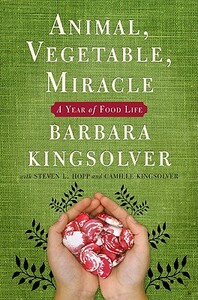You need to sign in or sign up before continuing.
Take a photo of a barcode or cover
I really wanted to like this one. It had been at the top of my "to read" pile since 2009. I just don't think Kingsolver and I are meant to be. I read "The Bean Trees" a few years back and gave it 2 stars. I liked the premise - family goes back to their Virginia homestead to live off the land for one year! Growing all their own food! Making conscious choices about their food! Thinking about how far food travels to get here! Taking 'eating locally' to the next level! All great things to think about and do and it did make me re-think some of my "healthy" choices - bagged salads, lean protein from origins unknown (hopefully not CAFO, but I honestly don't know), how far bananas have to travel to me, focusing on eating seasonally for environmental and taste reasons, etc. Lots of great things to think about and I appreciate Kingsolver's - and her family's - wholehearted commitment to their project. Truly.
But. There was undercurrent of sanctimony that turned me off to the whole thing. All I could think about was the Ina Garten store-bought memes. Is home-grown best? Probably. But not feasible for most of the population. Should I use the farmer's market more? Yes. But please don't get all judgey about it. At first I found the little snippets from her family - they write little excerpts throughout - cute. But they quickly became annoying. Dad brought in the industry perspective and older sister felt very smug about her food habits, even thought she left for college shortly after the experiment started and had to *gasp* deal with dorm food. Luckily, she was smart enough to ask all the food vendors about where their food comes from and could make informed choices. I'm sure they're a lovely family and people, but the tone was so off-putting. A shame, because it covers a lot of really great issues from a unique perspective. Probably not going to be picking up any more Kingsolver; I tried!
I did really like the last chapter on the turkey eggs, though. Very sweet. Also, the younger daughter was great with her egg business!
This was a great read. It confirms a lot of the ideas that Patrick and I have about eating - and shopping. Of course, the author was better equipped to carry out her plan of living locally than we are. Even so, the book is thought-provoking in introducing the ideas of seasonal eating and making smarter choices with what is available in your neck of the woods.
Now... I just need to move to Appalachia and start my own farm!
Now... I just need to move to Appalachia and start my own farm!
I enjoyed this book very much, and will try in the future to get more "Local Foods", to a large extent something I already do. My major issue with the book is when Kingsolver tries to convince me a 30 year and counting vegetarian, that it'd be better for the planet if I just ate locally sourced meat. I have never tried to get anyone to become a vegetarian, and I never will. If someone asks me about being a vegetarian, I'd share with them my reasons, I wouldn't try to get them to become one. Just as I wouldn't try to change a Republican into a Democrat or a religious person into an Atheist.
Journal of Environmental Science and Technology. The abstract for this article is a prime example of clear writing and good lifecycle analysis — which don’t usually go together — so check it out. But here’s the essence:
Food is transported a long way, going about 1,000 miles in delivery and over 4,000 miles across the supply chain.
But 83% of the average U.S. household’s carbon footprint for food comes from growing and producing it. Transportation is only 11%.
Different foods have vastly different greenhouse gas (GHG) intensity, with meat requiring far more energy to produce, and red meat being particularly egregious, requiring 150% more energy than even chicken.
So the journal article adds this up to an obvious conclusion: if you want to reduce your food’s carbon footprint, eat less meat. In short, “Shifting less than one day per week’s worth of calories from red meat and dairy products to chicken, fish, eggs, or a vegetable-based diet achieves more GHG reduction than buying all locally sourced food.”
https://hbr.org/2011/06/local-food-or-less-meat-data-t.html
This book was wonderful. The grand idea behind it I already knew, understood and believed in, but this book made it so much more dimensional. The essays by her daughter and husband that were interspersed were informative and the text itself was beautifully written. It left me itching to create a garden of my own (on hold because I'll be away this summer) or join a CSA.
Interesting concept, but by the end you can see it's for people with means and higher class. Also to not experience things that are from far away lands is a sad existence. I found it preachy and elitist. I wish it would have had more about how to do this on a smaller scale and how individuals can make an impact without being able to change their whole life.
funny
informative
lighthearted
medium-paced
hopeful
informative
inspiring
reflective
medium-paced
i thought i would enjoy reading about the trials and tribulations (and jubilations!) of growing your own food for a year. battled through chapters bellowed down from a soapbox and gave up when she randomly went on a pages-long rant about how much better she is than vegans. uncalled for (and incorrect)!
"Eaters, that is, must understand that eating takes place inescapably in the world, that it is inescapably an agricultural act, and how we eat determines, to a considerable extent, how the world is used.” -- Wendell Berry
Critics of Barbara Kingsolver tend to agree that one of her faults is “preaching.” But in a nonfiction book like this, you’re hardly ambushed by her so-called agenda. And here’s the thing: it’s a book about food, and it’s pretty impossible to write about food without sounding “preachy.” It’s not a neutral subject. So maybe “preaching” is simply “passion.” And I would venture to guess that anyone who picks up this book is at least a little bit interested in mindful, ethical eating, or the implications of our choices.
And honestly, I didn’t find Kingsolver to be preachy or condescending here. If I did, I probably wouldn’t have felt inspired to join a CSA or try much harder to make sure we’re choosing to eat in-season, locally grown produce. We certainly don’t do it all perfectly; when Matt and I read Eating Animals a few years ago and decided to avoid buying and eating factory-farmed meat, it wasn’t because Jonathan Safran Foer tried to tell us we had to be vegetarian. In Animal, Vegetable, Miracle Kingsolver writes, “If a friend had a coronary scary and finally started exercising three days a week, who would hound him about the other four days?” We begin where we can, and we learn, and we do better when we know better.
If you need another selling point, it’s Kingsolver. She writes gorgeous sentences. I read this book slowly, all summer long, and I looked forward to picking it up every time. And I loved the last couple of chapters so much I reread them after I finished the book. Maybe minus one teeny-tiny star for glossing over (I felt) the very real class issues in our country -- not everyone has this kind of choice -- but one book can’t do everything.
Critics of Barbara Kingsolver tend to agree that one of her faults is “preaching.” But in a nonfiction book like this, you’re hardly ambushed by her so-called agenda. And here’s the thing: it’s a book about food, and it’s pretty impossible to write about food without sounding “preachy.” It’s not a neutral subject. So maybe “preaching” is simply “passion.” And I would venture to guess that anyone who picks up this book is at least a little bit interested in mindful, ethical eating, or the implications of our choices.
And honestly, I didn’t find Kingsolver to be preachy or condescending here. If I did, I probably wouldn’t have felt inspired to join a CSA or try much harder to make sure we’re choosing to eat in-season, locally grown produce. We certainly don’t do it all perfectly; when Matt and I read Eating Animals a few years ago and decided to avoid buying and eating factory-farmed meat, it wasn’t because Jonathan Safran Foer tried to tell us we had to be vegetarian. In Animal, Vegetable, Miracle Kingsolver writes, “If a friend had a coronary scary and finally started exercising three days a week, who would hound him about the other four days?” We begin where we can, and we learn, and we do better when we know better.
If you need another selling point, it’s Kingsolver. She writes gorgeous sentences. I read this book slowly, all summer long, and I looked forward to picking it up every time. And I loved the last couple of chapters so much I reread them after I finished the book. Maybe minus one teeny-tiny star for glossing over (I felt) the very real class issues in our country -- not everyone has this kind of choice -- but one book can’t do everything.



